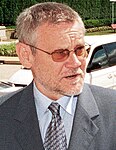Croatian parliamentary election, 1992
|
|
||||||||||||||||||||||||||||||||||||||||||||||||||||||||||||||||||||
|
||||||||||||||||||||||||||||||||||||||||||||||||||||||||||||||||||||
|
||||||||||||||||||||||||||||||||||||||||||||||||||||||||||||||||||||
|
||||||||||||||||||||||||||||||||||||||||||||||||||||||||||||||||||||
Parliamentary elections were held alongside presidential elections in Croatia on 2 August 1992, the first after independence and under the new constitution. All 138 seats in the Chamber of Representatives were up for election. The result was a victory for the Croatian Democratic Union, which won an absoulute majority of 85 seats. Voter turnout was 75.6%.
The circumstances under which elections took place were extraordinary - one third of the country was occupied by Krajina forces, while Croatia itself was involved in war raging in neighbouring Bosnia and Herzegovina. Few people, however, doubted their legitimacy because old Parliament, elected under old Communist Constitution and in a time when Croatia had been part of Yugoslavia, clearly didn't correspond to new political realities.
Although new Constitution called for two houses of Parliament, only one - House of Representative - was elected.
New electoral laws, written by Smiljko Sokol, were passed and new voting system - combination of First past the post and proportional representation was introduced. 60 members were to be elected in individual constituencies while 60 seats were to be distributed among those candidates' lists who broke 2% threshold. 12 seats were reserved for expatriate Croatians, while the Parliament had to have at least 15 members belonging to ethnic minorities - 11 Serbs and 4 others.
Franjo Tudjman and his Croatian Democratic Union party entered campaign with great confidence, because Croatia, despite being partially occupied, had won independence and international recognition under his leadership. State-controlled media at the time presented war as practically won and peaceful reintegration of Krajina a mere formality that would occur in very foreseeable future.
...
Wikipedia



